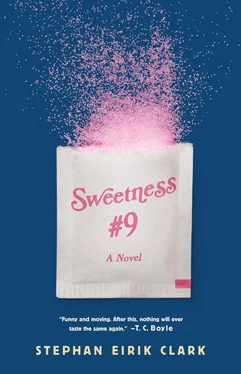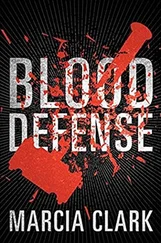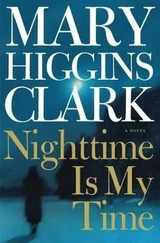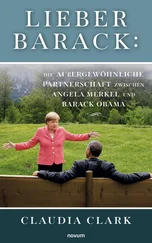I collapsed into my chair, wondering if my rage was misdirected. After all, Better Health and Flavorings had nothing to do with Sweetness #9 anymore; only the Sugar Hill Group did. But Hickey and many of the administrators under whom I’d once worked weren’t with the latter; they had stayed on with the former. Strangely, I felt most venomous toward Goldstein, Olivetti, and Dark, a company that technically no longer existed, but directing my animus toward it made about as much sense as sending my prayers up to the acronym cobbled together from its name. In the end, I felt a great pang of envy for the Palestinians and the Jews. At least their hatred could be passed down through the generations.
I reached for the letter again, realizing now that it was wishful thinking to believe I’d be able to retain my job. Beekley they’d keep, and Koba, too, perhaps (he was so much unmolded clay). But me? Like Tennessee, I didn’t have youth on my side. As soon as I’d shown them where we kept our client lists and the bible containing all the recipes for our proprietary blends, they’d kick me to the curb with a twenty-dollar gift card to Starbucks as severance pay. It didn’t matter that after twenty-odd years I had a fair amount of stock and could expect a “compelling value realization” as a result of any sale. As soon as the money ran out, and it would, where would I be?
“Justice,” I said, as the storm howled outside. Was this justice? My wife and kids had let me off easy, but now here it was, ready to come ashore like a slow-moving storm: Hurricane Better Health and Flavorings. Would this be the thing to bring about my undoing?
Later that morning, unable to wait for an invitation, I drove to Ernst Eberhardt’s place, almost stalling out as I turned off of University Avenue onto his street. The road was flooded at the intersection, with water clear up into the sandbags protecting the door to the Dunkin’ Donuts.
After parking, I stepped out into a puddle, then hopped away from it, shaking my foot as I opened my umbrella against the rain. The wind immediately caught it, turning the umbrella inside out and pulling me across the road. I ran up to my mentor’s door and pounded on it, then crashed through, shaking myself dry like a dog, after he’d opened it.
“What are you doing?” he asked. He wore a blue cardigan over a white T-shirt that had lost the elastic in its collar. A trail of contrasting condiments stained one leg of his khaki pants. “Are we having breakfast?”
“It’s an unscheduled visit,” I said, as I set my umbrella down in the stand, then hung up my raincoat and sat on the bench to peel off my wet sock. “I’m sorry about this, but I just had to show you something.” I stepped into a pair of slippers and reached into the pocket of my sport coat for the letter.
Ernst read it as he led the way into the kitchen, but he barely gave it any consideration at all. As soon as we reached the table, he set it beneath the porcelain sweetener holder that was pushed up against the wall and told me they were like the newspaper. “They’ll call you every day if you let them, just to see if you’ve changed your mind. How many times do I have to say I don’t want the paper unless it’s written in German?”
“So you’re not selling?”
“Let’s have some coffee. Can we at least have some coffee?”
I sat at the table, watching as he gathered two cups and measured out the crystals from a jar of instant. The refrigerator started up with an asthmatic rumble. The wallpaper above it — a hunting motif marked by pheasants and thickets of trees — had peeled away in one place. The whole kitchen appeared shabbier than I remembered it. A shingle was missing from the roof of the cuckoo clock over the door, the linoleum curled up in places and was so old I didn’t think it could ever look clean, and the dark wooden cabinets were no more updated than the chipped Formica counter-tops. Smelling something, I looked to the sink and saw a tower of dirty dishes. It was enough for me to release a breath that sounded as strained as the refrigerator.
“Eliza doesn’t help out around here anymore?” I said.
“She’s a liberated woman.”
“What does that mean? She’s as filthy as a man? Look at your pants, Ernst.” He wiped at the condiment stains. “Is this how you dress when you don’t come in to work?”
He crossed his arms, staring down at the kettle. I sighed again, no longer sure if it was right to have come here with the hope of convincing him to keep the company.
“Maybe you should sell,” I said. “If not to them, then someone else. I don’t know how you persist in living here like you do. You’re a capitalist. You should be celebrating your successes, not living in a German neighborhood that doesn’t have any Germans anymore.”
“What am I?”
“Alone. The beer garden we used to frequent sells pupusas and chalupas now. If you stand on a street corner and say ‘schnitzel’ too loud, you’re bound to get knifed by a black man who thinks you’re a Jew with a funny curse. What kind of home is this?”
“Mine.”
“Yours. Your home was in Dresden before the war. You’re in America now. We move and keep moving. Go to Florida,” I said. “Arizona. Sun City. Sun City. ”
The kettle went to a boil. He brought it to the table and poured the steaming water into our cups.
“You’d think this was Communist Russia,” I said. “That you didn’t know we have freedom of movement.”
He went into the fridge for a glass jar in which several long hot dogs were suspended in cloudy water. As he twisted off the lid, more than just the smell of smoked meat was released.
“I was working on a line of deli meat flavorings when we met. The whole week I’d had it wrong.” He fished out a hot dog and took a bite, showing no pleasure on his face. “The after-notes lingered like the taste of cold metal. But then I went to a matinee at the Phoenix”—he pointed toward a movie theater that had been demolished more than twenty years ago—“and I saw her. She dropped her keys in front of the box office and bent over to pick them up.”
“This isn’t Eliza you’re talking about, is it?”
“Beneath the fabric of her skirt, her flesh shifted like the pistons in a great machine.” Ernst placed the hot dog in his mouth like a cigar so his hands were free to play with the memory. “I caught a glimpse of that zipper only women wear. On the side? The fabric pulled away from it as she bent over; it sparkled in the sun. Is there anything more arousing than this reminder of a woman’s carnality? Of what lies beneath?” He pulled the wiener from his mouth and reconsidered its pink, reconstituted flesh. “This is why women in Muslim countries wear veils. Their men are more honest. They acknowledge how easily they are undone.”
When he looked up again, he was smiling in a way I hadn’t seen in years. “I offered her a job before I even saw her face. ‘Work for me,’ I said. ‘I need you to work for me.’” His smile somehow grew larger. “We made love three times that night.”
“Dear Christ, Ernst. I really don’t think I need to hear this. You know how I feel about that woman.”
“I was a young man again, my balls as heavy as military-grade steel.” His voice was like light sent from a dying star. It pulsed outward, full of an improbable vitality. “And when I awoke the following day?” He pointed upstairs. “I sat at my desk and wrote out the formulas for almost the entire line of flavorings I was working on. I could taste them in the back of my throat. The chemical names came to me one after the other, still vivid from my dreams. I plucked them from the air like ornaments from a Christmas tree.”
It was his “Kubla Khan,” a month’s worth of work performed in a frozen moment. But as he looked at the last rounded bite of his hot dog, he shook his head with all the sadness of Coleridge over his own noble fragment.
Читать дальше












